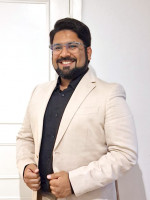Saad Abdullah, Associated Senior Lecturer

Saad Abdullah is a dynamic researcher with a Ph.D. in Biomedical Engineering. He is driven by a passion to revolutionize healthcare through technological advancements. With expertise in medical devices, biosensors, and signal processing, Saad specializes in non-invasive monitoring and digital health solutions. He is skilled in laboratory operations, teaching, and effective scientific communication. Saad is particularly passionate about integrating photoplethysmography (PPG), machine learning, and artificial intelligence (AI) to deliver transformative outcomes in patient care. Saad earned his Ph.D. in Biomedical/Medical Engineering from Università degli Studi di Brescia, where he was actively involved in the design and development of medical equipment. His major project involved designing and developing advanced measurement systems for biomolecule detection. Saad also spearheaded an innovative approach for the detection of p53 protein using spectrophotometry. His exceptional work earned him the prestigious Erasmus+ scholarship for conducting Ph.D. research at the University Polytechnique Catalunya (UPC) in Spain.
Saad Abdullah specializes in non-invasive monitoring and digital health solutions, with a particular focus on Biosignals. Saad is passionate about integrating PPG, machine learning, and artificial intelligence (AI) to deliver transformative outcomes in patient care. His expertise in signal processing and AI-based models enables him to analyze PPG signals for cardiovascular health monitoring. Saad’s research aims to advance the field of PPG signal analysis and develop innovative techniques for accurate and real-time cardiovascular health assessment.
Saad has made significant contributions to the field of PPG signal analysis. One of his notable publications is titled "A Novel Fiducial Point Extraction Algorithm to Detect C and D Points from the Acceleration Photoplethysmogram (CnD)". In this study, Saad and his colleagues proposed a novel fiducial point extraction algorithm that accurately identifies c and d points from the acceleration photoplethysmogram (APG). The algorithm demonstrated a high level of accuracy in detecting fiducial points, making it a valuable resource for researchers and healthcare professionals working with photoplethysmography signals.
Real-time Biosignal Processing and Feature Extraction from Photoplethysmography Signals for Cardiovascular Disease Monitoring (Oct 2024) Saad Abdullah, Annica Kristoffersson, Maria Lindén medicinteknikdagarna 2024 (MTD 2024)
Skin Cancer Diagnosis through Machine Learning: An Educational Tool for Improved Detection (Oct 2024) Saad Abdullah, Kehkashan Kanwal , Abdelakram Hafid, Parveen Ghafoor , Annica Kristoffersson medicinteknikdagarna 2024 (MTD 2024)
Current Diagnostic Techniques for Pneumonia: A Scoping Review (Jul 2024) Kehkashan Kanwal , Muhammad Asif , Syed Ghufran Khalid , Haipeng Liu , Aisha Ghazal Qurashi , Saad Abdullah
Enhancing Speech Emotion Recognition Using Deep Convolutional Neural Networks (May 2024) M M Manjurul Islam , Md Alamgir Kabir , Alamin Sheikh , Muhammad Saiduzzaman , Abdelakram Hafid, Saad Abdullah International Conference on Machine Learning Technologies (ICMLT)
Impact of Activities in Daily Living on Electrical Bioimpedance Measurements for Bladder Monitoring (Jul 2023) Abdelakram Hafid, Saad Abdullah, Maria Lindén, Annica Kristoffersson, Mia Folke 2023 IEEE 36th International Symposium on Computer-Based Medical Systems (CBMS) (CBMS'23)
Machine Learning-Based Classification of Hypertension using CnD Features from Acceleration Photoplethysmography and Clinical Parameters (Jul 2023) Saad Abdullah, Abdelakram Hafid, Maria Lindén, Mia Folke, Annica Kristoffersson 2023 IEEE 36th International Symposium on Computer-Based Medical Systems (CBMS) (CBMS'23)

